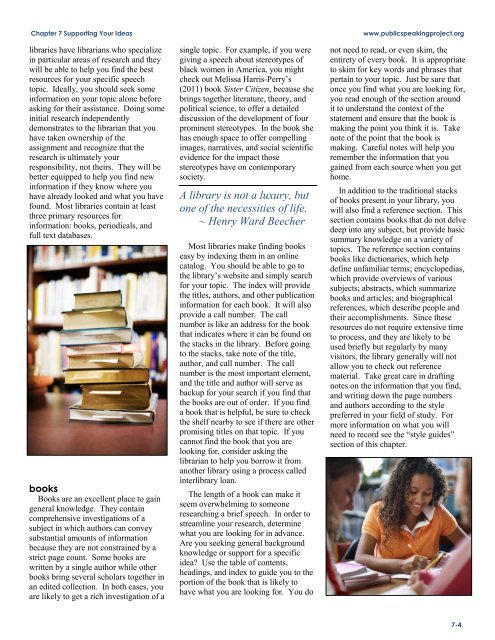supporting your ideas - The Public Speaking Project
supporting your ideas - The Public Speaking Project
supporting your ideas - The Public Speaking Project
You also want an ePaper? Increase the reach of your titles
YUMPU automatically turns print PDFs into web optimized ePapers that Google loves.
Chapter 7 Supporting Your Ideas www.publicspeakingproject.org<br />
libraries have librarians who specialize<br />
in particular areas of research and they<br />
will be able to help you find the best<br />
resources for <strong>your</strong> specific speech<br />
topic. Ideally, you should seek some<br />
information on <strong>your</strong> topic alone before<br />
asking for their assistance. Doing some<br />
initial research independently<br />
demonstrates to the librarian that you<br />
have taken ownership of the<br />
assignment and recognize that the<br />
research is ultimately <strong>your</strong><br />
responsibility, not theirs. <strong>The</strong>y will be<br />
better equipped to help you find new<br />
information if they know where you<br />
have already looked and what you have<br />
found. Most libraries contain at least<br />
three primary resources for<br />
information: books, periodicals, and<br />
full text databases.<br />
books<br />
Books are an excellent place to gain<br />
general knowledge. <strong>The</strong>y contain<br />
comprehensive investigations of a<br />
subject in which authors can convey<br />
substantial amounts of information<br />
because they are not constrained by a<br />
strict page count. Some books are<br />
written by a single author while other<br />
books bring several scholars together in<br />
an edited collection. In both cases, you<br />
are likely to get a rich investigation of a<br />
single topic. For example, if you were<br />
giving a speech about stereotypes of<br />
black women in America, you might<br />
check out Melissa Harris-Perry’s<br />
(2011) book Sister Citizen, because she<br />
brings together literature, theory, and<br />
political science, to offer a detailed<br />
discussion of the development of four<br />
prominent stereotypes. In the book she<br />
has enough space to offer compelling<br />
images, narratives, and social scientific<br />
evidence for the impact those<br />
stereotypes have on contemporary<br />
society.<br />
A library is not a luxury, but<br />
one of the necessities of life.<br />
~ Henry Ward Beecher<br />
Most libraries make finding books<br />
easy by indexing them in an online<br />
catalog. You should be able to go to<br />
the library’s website and simply search<br />
for <strong>your</strong> topic. <strong>The</strong> index will provide<br />
the titles, authors, and other publication<br />
information for each book. It will also<br />
provide a call number. <strong>The</strong> call<br />
number is like an address for the book<br />
that indicates where it can be found on<br />
the stacks in the library. Before going<br />
to the stacks, take note of the title,<br />
author, and call number. <strong>The</strong> call<br />
number is the most important element,<br />
and the title and author will serve as<br />
backup for <strong>your</strong> search if you find that<br />
the books are out of order. If you find<br />
a book that is helpful, be sure to check<br />
the shelf nearby to see if there are other<br />
promising titles on that topic. If you<br />
cannot find the book that you are<br />
looking for, consider asking the<br />
librarian to help you borrow it from<br />
another library using a process called<br />
interlibrary loan.<br />
<strong>The</strong> length of a book can make it<br />
seem overwhelming to someone<br />
researching a brief speech. In order to<br />
streamline <strong>your</strong> research, determine<br />
what you are looking for in advance.<br />
Are you seeking general background<br />
knowledge or support for a specific<br />
idea? Use the table of contents,<br />
headings, and index to guide you to the<br />
portion of the book that is likely to<br />
have what you are looking for. You do<br />
not need to read, or even skim, the<br />
entirety of every book. It is appropriate<br />
to skim for key words and phrases that<br />
pertain to <strong>your</strong> topic. Just be sure that<br />
once you find what you are looking for,<br />
you read enough of the section around<br />
it to understand the context of the<br />
statement and ensure that the book is<br />
making the point you think it is. Take<br />
note of the point that the book is<br />
making. Careful notes will help you<br />
remember the information that you<br />
gained from each source when you get<br />
home.<br />
In addition to the traditional stacks<br />
of books present in <strong>your</strong> library, you<br />
will also find a reference section. This<br />
section contains books that do not delve<br />
deep into any subject, but provide basic<br />
summary knowledge on a variety of<br />
topics. <strong>The</strong> reference section contains<br />
books like dictionaries, which help<br />
define unfamiliar terms; encyclopedias,<br />
which provide overviews of various<br />
subjects; abstracts, which summarize<br />
books and articles; and biographical<br />
references, which describe people and<br />
their accomplishments. Since these<br />
resources do not require extensive time<br />
to process, and they are likely to be<br />
used briefly but regularly by many<br />
visitors, the library generally will not<br />
allow you to check out reference<br />
material. Take great care in drafting<br />
notes on the information that you find,<br />
and writing down the page numbers<br />
and authors according to the style<br />
preferred in <strong>your</strong> field of study. For<br />
more information on what you will<br />
need to record see the “style guides”<br />
section of this chapter.<br />
7-4


